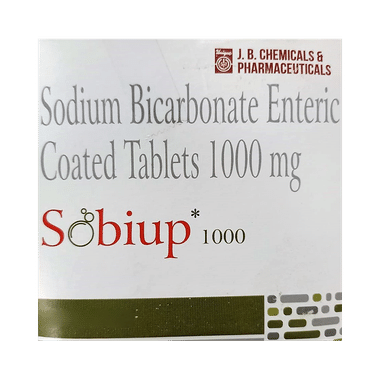Sobimax EC 1000 Tablet
 Prescription Required
Prescription Required

Product introduction
Sobimax EC 1000 Tablet relieves irritation by producing carbon dioxide, which neutralizes the acid present in the stomach. It also increases the pH of blood and urine, thereby correcting acid indigestion, heartburn. Additionally, it helps in the removal of toxic substances from the body in certain types of poisoning.
Sobimax EC 1000 Tablet may be taken with or without food in a dose and duration as advised by the doctor. Excessive intake may cause an electrolyte imbalance, leading to unwanted side effects. Keep taking this medicine for as long as your doctor recommends. If you stop treatment too early, your symptoms may come back and your condition may worsen.
Common side effects of this medicine include high sodium levels, cerebral edema, alkalosis, and hypokalemia. Let your doctor know if any of these side effects persist or get worse. They may be able to help by adjusting the dosage or by prescribing you an alternate medicine.
It is important to consult a doctor before taking Sobimax EC 1000 Tablet if you are suffering from stomach and kidney disease. Let your doctor also know about all other medications you are taking, as some may affect, or be affected by, this medicine. Pregnant or breastfeeding women should also consult their doctor before taking this medicine.
Uses of Sobimax Tablet
- Management of Metabolic acidosis
Benefits of Sobimax Tablet
In Management of Metabolic acidosis
Side effects of Sobimax Tablet
Common side effects of Sobimax
- Increased sodium level in blood
- Brain swelling
- Alkalosis
- Decreased potassium level in blood
How to use Sobimax Tablet
How Sobimax Tablet works
Safety advice
What if you forget to take Sobimax Tablet?
All substitutes
Quick tips
- Take Sobimax EC 1000 Tablet at least 1 to 2 hours before or after other medications, as it may affect their absorption.
- Avoid taking it with large meals regularly, as excessive use can lead to rebound acidity.
- Avoid Sobimax EC 1000 Tablet, if you show signs of appendicitis or inflammed bowel (such as lower abdominal pain, cramping, bloating, nausea, vomiting). Please consult your doctor.
- Do not use it as a long-term solution for heartburn or acidity without medical supervision.
- Monitor sodium intake if you have high blood pressure, kidney issues, or are on a salt-restricted diet.
- Dissolve the Sobimax EC 1000 Tablet completely in water before consuming to reduce the risk of stomach discomfort.
Fact Box
Interaction with drugs
Patient concerns
FAQs
What is the difference between medical-grade sodium bicarbonate (present in Sobimax EC 1000 Tablet) and regular baking soda?
When should I take Sobimax EC 1000 Tablet?
What serious side effects should I watch for?
Who should exercise caution before taking Sobimax EC 1000 Tablet?
Can I take Sobimax EC 1000 Tablet long-term?
Disclaimer:
Tata 1mg's sole intention is to ensure that its consumers get information that is expert-reviewed, accurate and trustworthy. However, the information contained herein should NOT be used as a substitute for the advice of a qualified physician. The information provided here is for informational purposes only. This may not cover everything about particular health conditions, lab tests, medicines, all possible side effects, drug interactions, warnings, alerts, etc. Please consult your doctor and discuss all your queries related to any disease or medicine. We intend to support, not replace, the doctor-patient relationship.References
- McQuaid KR. Drugs Used in the Treatment of Gastrointestinal Diseases. In: Katzung BG, Masters SB, Trevor AJ, editors. Basic and Clinical Pharmacology. 11th ed. New Delhi, India: Tata McGraw Hill Education Private Limited; 2009. p. 1069.
Marketer details
Lab tests offered by us







